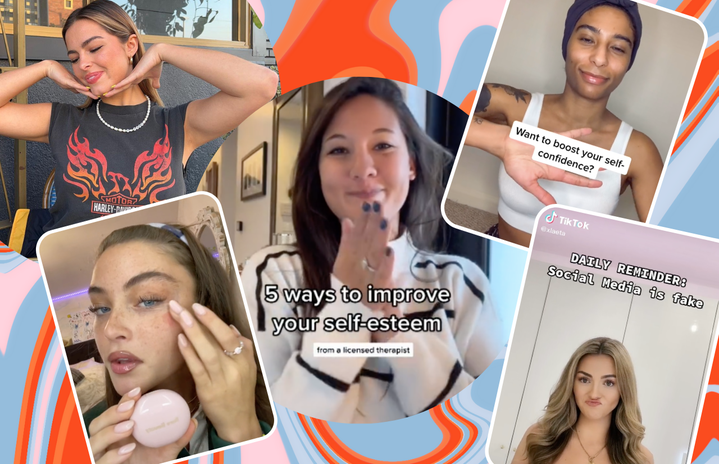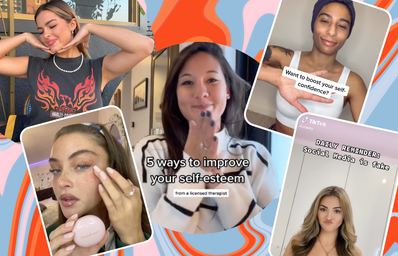When we join different social medias, we discover a completely different reality from the one we live in nowadays. That’s because, in social media, we just share a really small part from our lives – usually, the good ones. But that little clipping we see other people doing – or we do ourselves – on the internet can be really nocive when we block our cellphones and are faced with a different context from what we have imagined inside the screens. But how was this imaginary reality created?
The perfect life of social media
Have you ever heard the term “toxic positivity”? It’s the way people started to call those actions that force a good vibe in contexts or situations that are impossible, or to those people that keep well every second of their lives. The most common way to find content like this is by looking at influencers’ Instagrams, in which really people with a gigantic number of followers spread content preaching happiness as a lifestyle, always lavishing a slender body, amazing trips, stunning homes, new cars and full-time joy.
But, much more than annoying, this kind of positivity can be harmful to body and mind health. When we just acompain people that show only the perfect parts of their lives, we start to believe our life isn’t good enough and dream to live a reality exactly like the one we see on social media – after all, if that person managed to achieve the “perfect lifestyle”, so should we. Although the reality is that we start to try to achieve an impossible objective, and it hurts not just our expectations, feelings, and psychology, but also our bodies.
“Life on the social network is an edited life, a life that does not portray your vulnerabilities. It’s very different from the real thing! On social media, people compare their lives to the perfect lives of others, and that creates this toxic positivity, which can be quite dangerous.”, says the psychologist of the Hapvida/RN Health System, Celiane Lopes.
However, it is not just the big influencers that contribute to the formation of a fictional reality and toxic positivity on social media. Everytime you, me and every person that have a account on any social network make a new post showing an amazing-completely without problems-a hundred percent good vibes life, with a high frequency (specially with the agility created with the Instagram Stories), also feeds this habit of hot takes: posting the perfect photo at the perfect moment, making the perfect comment on the perfect subject, perfectly engaging your followers with controversial content, good vibes or just about a perfect life that, in reality, is not so real.
But how do these hot takes on social media influence in real life?
A 2013 study developed by researchers from China and Singapore indicates that it is possible to classify people’s personalities from the analysis of their performances on social networks. Researchers Shuo Tian Bai and Ting Shao Zhu of Peking University in China, together with Li Cheng of the Singapore Institute of Bioinformatics, proposed “an objective and automatic personality prediction system based on the behavior of users on social networking sites”.
For this research, the scientists asked 200 Chinese students with accounts on a local social network, a competitor of Facebook, to take the Big Five Inventory – a questionnaire traditionally used to classify people according to the theory developed by the University of Berkeley in 1990. The researchers compared the results of the questionnaires with the students’ pages on the social network, analyzing items such as age and gender, but also the frequency of student updates, the most commonly used pronouns (I, we, you, they) and the emotional content of youth posts. Many correlations were found between the two sources of information, indicating that people’s personality classification may be reflected in their pages on social networks.
With this result, we can conclude that the frequency and the kind of content that we publish in our social media reveals much more about our personalities and feelings than the posts itselfs. Some of this costume we’ve created of always want to post, share and make be seen our hot takes is a social demand – and also a self-demand – to prove to your followers that you live a perfect life, just like the ones you find on the social networks of great influencers. None of them are necessarily 100% real, as the makeup put on with good filters, edits and the filtering of which moments we are going to post reveal only a small part of a full and complete experience.
The problem of sharing a 100% positive experience can arise from the incessant search for that happiness, which generates side effects in those who consume the “perfect life” of others on a daily basis. This perfection is very unlikely to occur all the time, points out Carla Furtado, a master in psychology and founder of Instituto Feliciência. “The difference between authentic, legitimate and real happiness and happiness posted on the networks is abysmal. Because happiness, as we approach it via positive psychology, is an intrinsic, internal experience that can, of course, be manifested, but has nothing to do with the ostentation of happiness”, says the researcher.
So, how do we solve this costume of always wanting to share “hot takes”?
It isn’t easy to find a way to break this costume, principally because it has been established in the majority of people’s lives. But, to maintain mental health and avoid being hit by toxic positivity, the rational use of social networks is the most appropriate, advises psychiatrist Renata Nayara Figueiredo, president of the Psychiatric Association of Brasília (APBr).
It’s important to understand that not always we have to be okay, share our good moments and much less believe in “perfect lives” that we see around. The psychiatrist also highlights that wanting to have a better life is not the problem, but believing that happiness will only be achieved when all desires are fulfilled. “The problem is when we project that happiness will only come when we have a wonderful home, when we live only traveling, when we have that car, when we have a million followers, for example. That’s the problem, wanting a life that is very difficult to have and only after reaching all these goals will we be happy. In fact, we have to be happy and keep improving little by little.”
Researcher Carla explains that toxic positivity affects followers and influencers. “We all lose: those who seek to replicate a behavior and those who are the target of a symbolic cloning of identity can also face a lot of suffering”, she adds. There is no problem to show yourself vulnerable and have a life full of ups and downs – because, in reality, that is the magic and the most beautiful part of real life.
Amanda Pavilião, journalism student from Cásper Líbero, is really active on her social media when the topic is the combat to toxic positivity and its impacts to mental health. Creator from “Revista Responsa Digital”, Amanda shares news about digital questions and its impacts on the mental health of users.
“You have to do a detox on the content you follow on social media, because it can happen that you follow some accounts and don’t effectively consume it’s content. It’s important to give a restart to your timeline. From there, you have to start following contents and content producers that aggregate your life, motivate you and make you feel well” she says, when asked how to combat the toxic positivity.
“It is kinda addictive to follow those kinds of bad contents because it instigates our curiosity, but when we clean our timeline and stories, it helps a lot to avoid the triggers and disappointments”, concludes.
With different experiences and good and bad moments we formulate who we are and who we want to be. Spending time with ourselves, without the pressure of having to post the perfect selfie or share the perfect opinion is essential for us to love our own company and reality. Try to spend a day just enjoying your time with you, doing things you love and, more than creating pictures, creating very good memories. In the end, the best way to fight against the toxic positivity coming from the rampant sharing of hot takes is just one: not being a part of it.
———————————————
The article above was edited by Lívia Carvalho.
Liked this type of content? Check Her Campus Casper Líbero home page for more!



